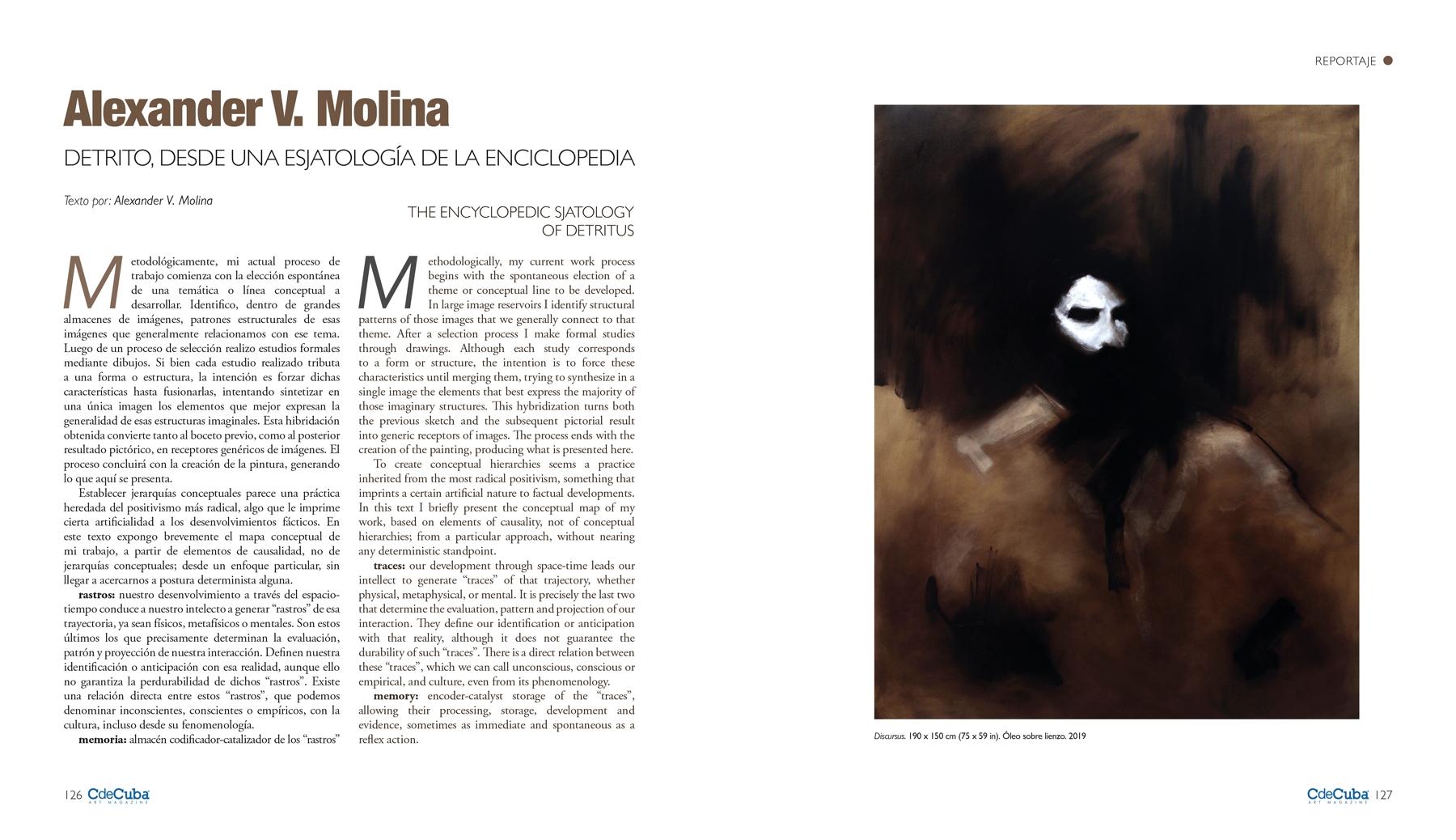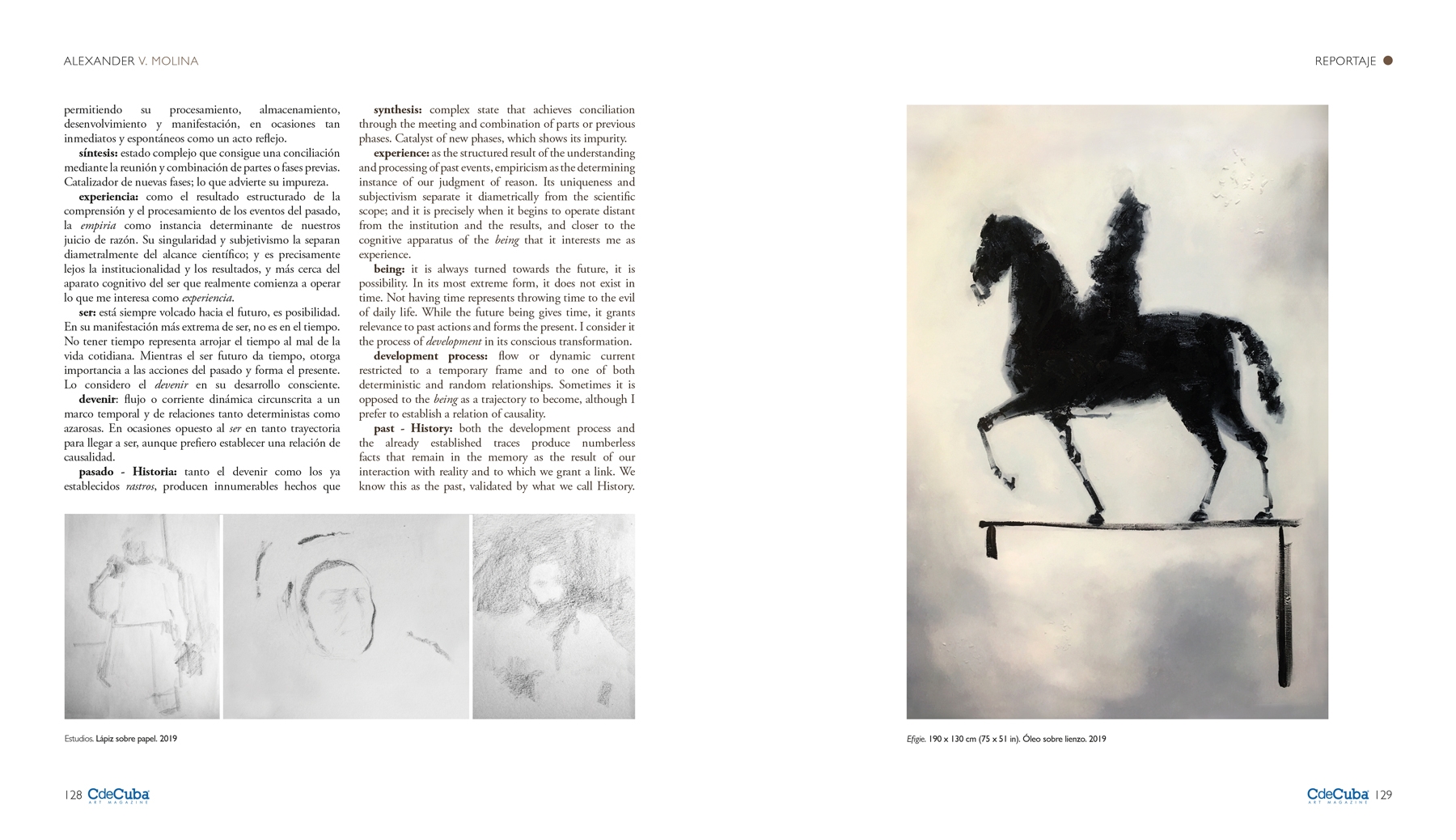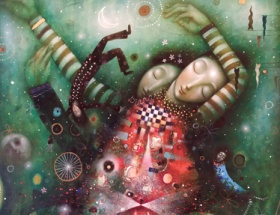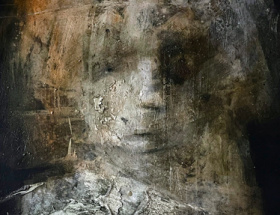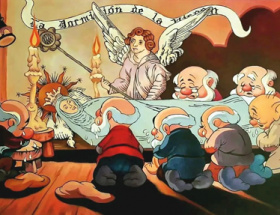The Encyclopedic Esjatology of Detritus
By Alexander V. Molina
Methodologically, my current work process begins with the spontaneous election of a theme or conceptual line to be developed. In large image reservoirs I identify structural patterns of those images that we generally connect to that theme. After a selection process I make formal studies through drawings. Although each study corresponds to a form or structure, the intention is to force these characteristics until merging them, trying to synthesize in a single image the elements that best express the majority of those imaginary structures. This hybridization turns both the previous sketch and the subsequent pictorial result into generic receptors of images. The process ends with the creation of the painting, producing what is presented here.
To create conceptual hierarchies seems a practice inherited from the most radical positivism, something that imprints a certain artificial nature to factual developments. In this text I briefly present the conceptual map of my work, based on elements of causality, not of conceptual hierarchies; from a particular approach, without nearing any deterministic standpoint.
Traces: our development through space-time leads our intellect to generate “traces” of that trajectory, whether physical, metaphysical, or mental. It is precisely the last two that determine the evaluation, pattern and projection of our interaction. They define our identification or anticipation with that reality, although it does not guarantee the durability of such “traces”. There is a direct relation between these “traces”, which we can call unconscious, conscious or empirical, and culture, even from its phenomenology.
Memory: encoder-catalyst storage of the “traces”, allowing their processing, storage, development and evidence, sometimes as immediate and spontaneous as a reflex action.
Synthesis: complex state that achieves conciliation through the meeting and combination of parts or previous phases. Catalyst of new phases, which shows its impurity.
Experience: as the structured result of the understanding and processing of past events, empiricism as the determining instance of our judgment of reason. Its uniqueness and subjectivism separate it diametrically from the scientific scope; and it is precisely when it begins to operate distant from the institution and the results, and closer to the cognitive apparatus of the being that it interests me as experience.
Being: it is always turned towards the future, it is possibility. In its most extreme form, it does not exist in time. Not having time represents throwing time to the evil of daily life. While the future being gives time, it grants relevance to past actions and forms the present. I consider it the process of development in its conscious transformation.
Development process: flow or dynamic current restricted to a temporary frame and to one of both deterministic and random relationships. Sometimes it is opposed to the being as a trajectory to become, although I prefer to establish a relation of causality.
Past – History: both the development process and the already established traces produce numberless facts that remain in the memory as the result of our interaction with reality and to which we grant a link. We know this as the past, validated by what we call History. A question arises immediately: with which of the two do we identify more effectively the previous states of the being? The being is unique by nature, since only it can know itself, therefore it can only exist in itself and for itself. My past is of no real interest to the other as long as there is no direct connection to his past or to his self-knowledge (affinity). Similarly, that past may not be verifiable beyond the uniqueness represented by that being; therefore, very probably it will not be regarded as what we consider historical fact because perhaps its impact on plurality is so low that according to History it never happened. History studies the past of humanity, not the past of the uniqueness of the being. That is why History can be largely exclusive, since it does not recognize the past in all its extension, being based as it is on the verification of that past and not on speculation.
Power will: history is development process, because the power will is the dynamic axis of history; it is power will that has the capacity to establish or not the facts of the past.
In-formation: active set of processed data that form a message that changes the state of knowledge of the receiver.
Image: representation of the world in two dimensions. Summarized structure of experiences, effect it triggers. Exponential generating substance, especially because of its capacity to rescue past events. Each new image leaves trace of its presence, empty and unlimited presence that awaits its moment of re-presentation, emerging in a new state, altered by synaptic distortions. It is that immaterial structure capable of establishing a truce between reference and referent, between past and history, idea and reality.
Absence: presentation of the empty, but not necessarily of the emptiness; absence as an alienating instance, reluctant to its own presence. Constantly questioning what is emptiness like in a full space.
